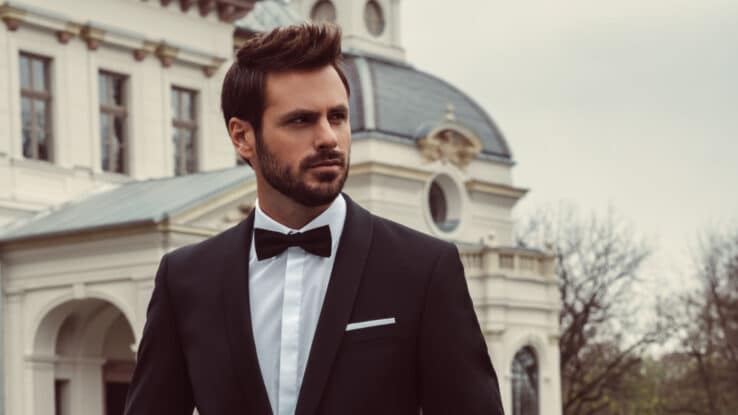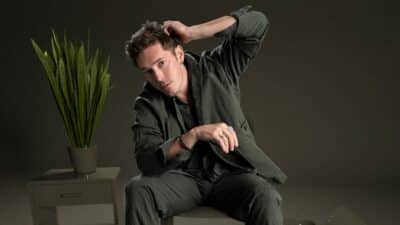Interview

Interview
HAUSER: “I can have a successful career for the next 100 years if I want to”
The rebellious cellist talks ‘Smooth Criminal’, his new Latin album, and why classical music lasts
Whatever image you have in your head of a classical cellist, it probably doesn’t look much like Stjepan Hauser. The musician has made it his mission to deliver classical music to pop and R&B fans, both through his 2CELLOS project and in his solo work. His shows see HAUSER reimagining popular tracks for the cello, as well as introducing fans to timeless classical pieces – a formula which has seen him play some of the world’s most historic venues. This month he’ll arrive in London’s O2 Arena to play tracks from his new album, The Player.
“I’m so excited,” he says. “I can’t wait to share this show with the world. People are gonna love it. I take them on a rollercoaster of emotions. In my show, they can cry, smile, dance, everything.”
Once a student at London’s Trinity College, HAUSER is particularly excited to return to the city. “I have so many memories from my student days,” he says. “I could see the O2 Arena from Greenwich, and many years later, I’m going to actually be playing there. It’s insane.”
We caught up with HAUSER ahead of his UK shows to talk about how he discovered his love for the cello, his famous guest spot on Glee, and how the classical world needs to get with the times.
You’ve played in a lot of amazing venues around the world. Do you have a favourite?
Well, of course, Royal Albert Hall. Those venues where you can really feel the history are always spectacular. Or if you are in some outdoor venue where you can see stars and the moon. This is also always inspiring, like the Colosseum in Rome, or another Colosseum in my hometown, Pula, or Red Rocks in the US… These kinds of venues feel special.
You were born into a musical family. Do you think it was inevitable that you were going to end up going into music?
Yeah, for sure. I was lucky that my parents were surrounded by art and music. I grew up with all those masterpieces. From an early age, I would listen to Beethoven symphonies, Mozart, Bach – I had the best influences. It all came naturally to me.
What was the age that you started gravitating towards the cello?
I was a very little boy. I heard the cello on the radio, and I fell in love with the sound. It was like this warm, beautiful sound. The piece was ‘The Swan’. It’s from The Carnival Of The Animals by Camille Saint-Saëns. I could really see the swan floating on the lake. And that was it. That was the moment.
Your mum played percussion. Did you take lessons in percussion as well?
No, I was actually lucky because I knew very early on what I want to do. Yeah, it’s very important. The sooner you start, the better.
Did you always take your music studies seriously?
No! In the beginning, when I started to play, I was not really that motivated. I didn’t have good teachers. But when I was 14, I really became obsessed with the cello. I started to play when I was eight, but it wasn’t until another teacher came along and started boosting my confidence. I was suddenly inspired, you know? I start practicing like crazy and that was it. I never looked back from that moment.
One word of encouragement can change your whole life. Until that point, no one had told me that I’m talented. I was stuck in my hometown without a good teacher, and no one would ever say anything. And then suddenly, for the first time, I hear that I’m talented and this is something I should dedicate myself to. Suddenly my whole perception changed. And I started practicing every day, all day. I improved rapidly from that point.
What were your ambitions at that point?
I was focused only on classical music for many years, and on becoming as good a cellist as possible. My dream was to become a soloist, of course, and to play these classical cello concertos all over the world. But then, as I grew older, my horizons expanded. I started to get more influences from different genres and artists, and I became more creative outside of classical music. That’s where everything started; first with 2CELLOS, and now with me as a solo artist.
Do you remember the first piece of popular music that you decided you could make work on the cello?
I was frustrated because it was not easy to make it in the classical music world. You need the right connections, the right teachers, the right conductors, you need to go to competitions… It was so hard to make it and I was really frustrated by it all. So I knew I had to do something different. Something crazy, something unique, something out of the box. At the time, I didn’t know much about anything. The only name [outside of classical music] that I’d heard of was Michael Jackson, because he was so popular. So I typed “Michael Jackson” into YouTube and the first song I heard was ‘Smooth Criminal’. Suddenly, my whole perception shifted. I thought, wow, look at this rhythm, look at this energy. That was it, basically. From that one moment, the whole project was born.
And ‘Smooth Criminal’ is the song that you ended up taking to Glee. That performance is still considered one of the best performances ever on that show. What do you remember about that experience?
We spent all day shooting, and we destroyed so many bows. It was really tough on your hands. We were just going through them like crazy. We were really young and full of adrenaline though, so we played like there was no tomorrow.
That was with 2CELLOS – can you tell me more about how that duo was formed?
Me and Luka [Šulić] had the same frustrations, the same problems. We decided to join forces and do something unique. We wanted to fill up arenas and big stadiums. We wanted to do something spectacular. We did that ‘Smooth Criminal’ cover and from that point on, the ideas just kept coming. We toured the world for so many years. It was an amazing revolution, actually.
The word ‘rebel’ has been used a lot to describe you, and you’ve adopted it yourself now and then. Do you think of yourself as a rebel?
Oh, definitely. I mean, the beginning of 2CELLOS was a big rebellion. Exploring all those genres, and all those different styles, that was never done before for the cello. I always wanted to prove to the world that the cello can do so many great things and can be really cool. There’s not just one way of playing it.
Was that the thinking behind your latest record as well?
Yes, for sure. Now I have this project of Latin music, which is so crazy because it makes everyone get up and dance. I always like to keep one part of the show more classical and romantic, and one part of the show for everyone to go crazy.
You’ve experimented with a few different genres. What drew you to Latin music?
My basis is always these beautiful, popular classical pieces, and romantic songs. This is more or less my foundation. On top of that, I always like to experiment with something on the side, but I think my main foundation is classical and romantic. This is what I like to listen to the most.
I love Latin music because it’s full of passion, energy, and adrenaline. And also, I’m a showman, so I like to have part of the show that really engages with the audience, and I think Latin music was the perfect choice for that. It’s universal, too. The whole world knows the songs.
Do you have a favourite Latin song?
I love ‘Sway’, because I can show my personality through the song so much. It’s charming. Also, you can be sensual, energetic and passionate all at the same time.
What’s your relationship with the classical world these days?
I love classical music so much. It’s always the foundation of everything that I do. But I think many of the performers are boring. They stick to unnecessary rules, and they don’t really connect to the audience in the right way. It always bothered me that they are often very cold on stage. I’m an entertainer, I like to give the people love. And then they give it back. I’m just a different kind of performer, and in the classical world that was tough for them to accept. They always put me in a cage with a set of rules to follow, you know? But now I’m free to do whatever I want. It’s perfect.
I think it’s something that social media has facilitated a lot, that idea that classical music can be for everyone and not just a certain group of people.
I think if you present it in the right way, everyone can fall in love with classical music. I was always sure of that. If you do it in a charismatic way, with personality, with passion, everyone is going to love it.
Do you think classical music traditionalists are beginning to realise this?
Well, you have artists like me that actually bring classical music to the masses. But then you have also purists who prefer to keep it a museum. They’re keeping the tradition, which is also important. We need both.
Why do you think classical music has longevity and ubiquity?
Because classical music surpasses all trends. Classical music always has audience. These pop stars are something right now, but the next trend is always someone else. This is why I’m so happy and lucky that I can have a successful career for the next 100 years if I want to, because with this genre you’re not chasing trends. I don’t depend on some radio hit or some summer smash. In the longterm, classical music always wins.









